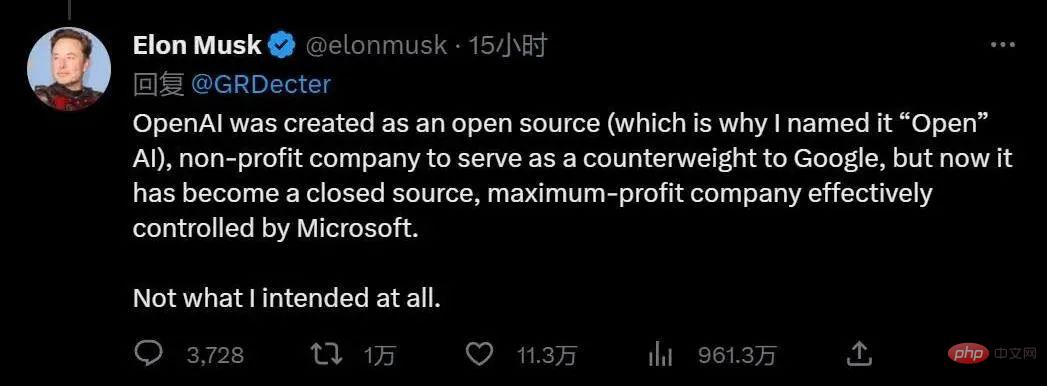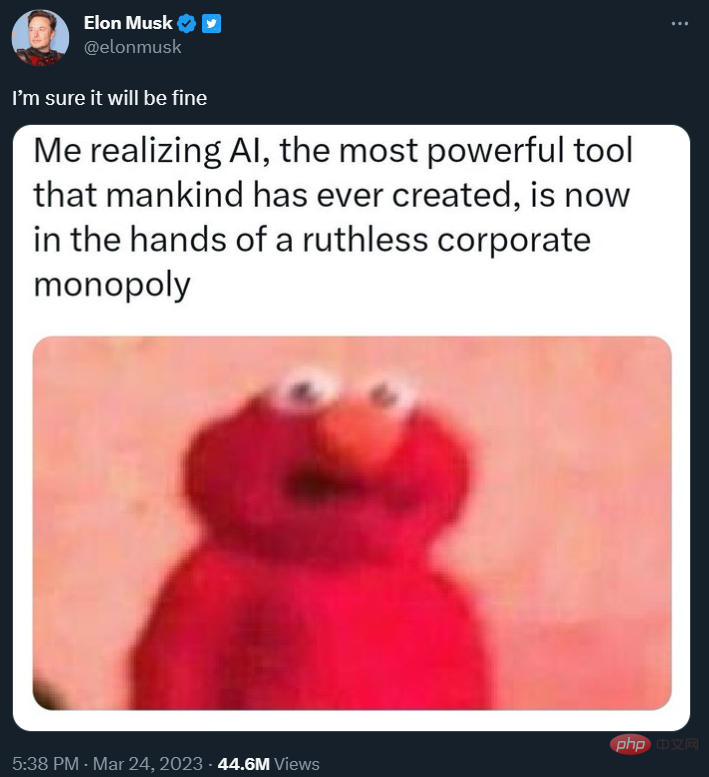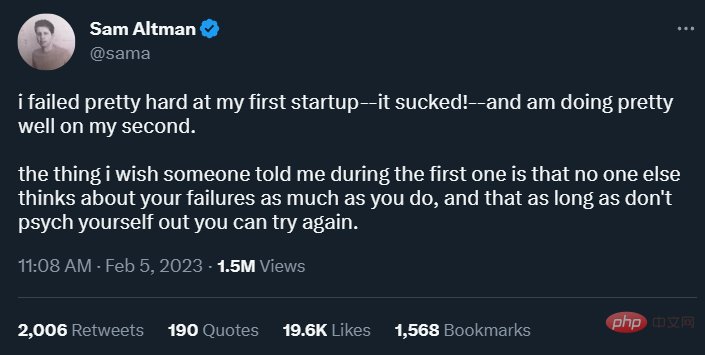Home >Technology peripherals >AI >The inside story of Musk's departure from OpenAI: The idea of monopolizing power was rejected, and the promised $1 billion was wasted
The inside story of Musk's departure from OpenAI: The idea of monopolizing power was rejected, and the promised $1 billion was wasted
- WBOYWBOYWBOYWBOYWBOYWBOYWBOYWBOYWBOYWBOYWBOYWBOYWBforward
- 2023-04-14 22:13:011037browse
Three years after the founding of OpenAI, Elon Musk is preparing to abandon the artificial intelligence research company he founded.
OpenAI was founded in 2015 as a nonprofit with support from billionaire tech luminaries such as Musk and Reid Hoffman, who Has invested US$1 billion as a group. OpenAI has attracted some of the top talent in the field away from large tech companies and academic institutions.
But people familiar with the matter said that as early as early 2018, Musk told Sam Altman, another OpenAI founder, that he believed the startup Already seriously lagging behind Google.
At the same time, Musk proposed a possible solution: He would take full control of OpenAI and operate it himself.
Altman and the other founders of OpenAI rejected Musk’s proposal. As a result, Musk left the company and reneged on a huge planned donation. This conflict ultimately led to Musk’s announcement to leave OpenAI on February 20, 2018. This will reshape an industry that is changing the world, and the prospects for the companies at its core.
In the public eye, the conflict also created a rift in the relationship between Musk and Altman, two of today’s biggest tech giants. News media company Semafor spoke with eight people familiar with the matter and disclosed the details for the first time in "The secret history of Elon Musk, Sam Altman, and OpenAI."
Musk and OpenAI
In 2018, there is no reason to think that the impulsive Musk or the eccentric, taciturn Altman will become the "Silicon Valley narrative" ” (Silicon Valley Narrative), even as they have become one of the most famous figures in Silicon Valley.
On the one hand, Musk has other headaches, including difficulties in ramping up Model 3 production capacity and plummeting stock prices, which have threatened the company's future.
On the other hand, OpenAI co-founder Greg Brockman, who served as chief technology officer at the time, and others at OpenAI also opposed Musk's takeover. According to people familiar with the matter, there was a power struggle within the company.
At this point, Altman, who also runs the famous startup incubator YCombinator, stepped in. In 2018, he added the title of president in addition to his role as director, according to tax filings.
Subsequently, Musk resigned from OpenAI’s board of directors. Publicly, both he and OpenAI said the reason for his departure was a conflict of interest. That is, Tesla, which is developing its own artificial intelligence system for autonomous driving, will compete with OpenAI for talent.
This reason for competition also makes sense. Tesla has poached one of OpenAI’s brightest minds, Andrej Karpathy. Later, he became the architect of Tesla's self-driving project.
But at OpenAI, almost no one believes that Musk resigned because of this. His exit speech before leaving the OpenAI offices, blaming his departure primarily on a potential conflict of interest, was not well received by most employees, who were completely unconvinced by the story.
The OpenAI announcement said Musk would continue to fund the organization, but according to people familiar with the matter, Musk has not done so. He had pledged to donate about $1 billion to OpenAI over several years (having previously donated $100 million), but his donations ended after leaving office, people familiar with the matter said. This leaves the nonprofit unable to afford the astronomical costs associated with training AI models on supercomputers.

#That fall, for some at OpenAI, the cost of making OpenAI a cutting-edge artificial intelligence company was going to rise. One thing becomes more obvious. Google Brain’s “transformers” open up a new realm along which artificial intelligence can continue to improve. But that means feeding it endless amounts of data to train it — a costly endeavor.
But OpenAI still made a major decision to move to these transformer models.
On March 11, 2019, OpenAI announced that it was creating a for-profit entity in order to raise enough funds to build the computing power necessary to build large-scale AI models. "We want to increase our ability to raise capital while continuing to deliver on our mission, and no existing corporate structure that we know of is able to strike the right balance between the two," the company wrote at the time. OpenAI said it was working on Investors' profits are capped, with any excess going to the original nonprofit.
Altman also made an unusual decision for a tech boss: He would not take an equity stake in the new for-profit entity, according to people familiar with the matter. Altman had invested in several highly successful technology startups and was already very wealthy.
He also believes the company needs to become a commercial company to continue its business, but told people the project is not designed to make money. Eschewing any ownership interest will help him stay true to his roots and mission. But the decision actually put off some potential investors in OpenAI, who worried that Altmann didn't see the benefits of the project.
Less than six months later, OpenAI received a $1 billion investment from Microsoft. Microsoft can provide not only funding but also infrastructure technology. Together they built a supercomputer to train models, eventually creating large-scale models such as ChatGPT and the image generator DALL-E.
When ChatGPT launched in November, OpenAI instantly became the hottest new tech startup, forcing Google to scramble to catch up. According to people familiar with the matter, Musk was furious.
Last December, one month after the launch of ChatGPT, Musk closed OpenAI’s access to Twitter’s “firehose” data – which was signed before Musk acquired Twitter Open permissions are specified in a contract.
On February 17, he wrote on Twitter: "OpenAI was created as an open source, non-profit company (which is why I named it "OpenAI"). "AI) as a counterweight to Google, but now it has become a closed-source, profit-maximizing for-profit company effectively controlled by Microsoft."

On March 15, he wrote on Twitter: “I’m still confused how a nonprofit to which I donated about $100 million somehow became a $30 billion for-profit. .If it’s legal, why doesn’t everyone do it?"
OpenAI declined to comment. Musk also did not respond to a request for comment. But then he tweeted: "I believe everything will be fine." He also added an emoticon to the tweet, which read: "I realize that artificial intelligence, the most powerful tool ever created by mankind, is now being monopolized by ruthless corporations."

Subsequently, The Information reported that OpenAI board member Shivon Zillis had resigned. Ziris, the AI powerhouse who gave birth to Musk’s twins, did not respond to a request for comment.
Musk and Altman fight: Money is not the point
The dispute between Musk and OpenAI has little to do with OpenAI’s status as a for-profit entity. Instead, OpenAI has left Google in a passive position and Musk no longer relevant to the hottest thing in tech. Although it is well known that he played a crucial role in the founding of OpenAI, his subsequent departure only made him more angry and heartbroken. Musk now aims to launch his own AI startup, and despite being burdened with the expensive and distracting Twitter (not to mention Tesla and SpaceX), he will eventually catch up.
Most founder battles revolve around money and credit for an idea. For Musk, who has become the world's richest man from time to time, it seems to be more about ego, power and, I believe, his sincere desire to safely usher in the era of artificial intelligence. (He probably thinks he's the only one who can do it.)
For Altman, it's not about the money, either. One of the most surprising things about all of this is that he doesn't even own the slightest share of OpenAI, which highlights the unusual nature of this company and the AI industry as a whole.
It’s also personal for him, as his new role as CEO of OpenAI is a comeback story.
He wrote on Twitter last month: "My first startup failed like a mess - too bad! On my second startup, I failed miserably. Well done. The thing I wish someone told me when I failed the first time is that no one thinks about your own failure the way you do, and as long as you don't let yourself lose faith, you can try again."

Altmann won't make any money on his new startup, but he's earned himself a place in history.
The above is the detailed content of The inside story of Musk's departure from OpenAI: The idea of monopolizing power was rejected, and the promised $1 billion was wasted. For more information, please follow other related articles on the PHP Chinese website!
Related articles
See more- Technology trends to watch in 2023
- How Artificial Intelligence is Bringing New Everyday Work to Data Center Teams
- Can artificial intelligence or automation solve the problem of low energy efficiency in buildings?
- OpenAI co-founder interviewed by Huang Renxun: GPT-4's reasoning capabilities have not yet reached expectations
- Microsoft's Bing surpasses Google in search traffic thanks to OpenAI technology

